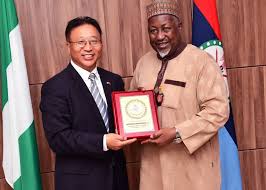President Bola Tinubu has called on China to share its technological expertise with Nigeria to address the country’s pressing infrastructure needs and support broader development across Africa. Tinubu, during a meeting with China’s Vice Minister of Foreign Affairs, Mr. Chen Xiaodong in Abuja, highlighted China’s remarkable technological progress and its role in transforming cities like Shanghai. He emphasized the importance of skill development and knowledge transfer in Nigeria’s quest for sustainable development.

Acknowledging the longstanding partnership between Nigeria and China, President Tinubu emphasized the need to nurture and promote this relationship for the benefit of both nations. He stressed the shared values of labor, understanding, and development, urging China to sustain its support for Africa’s needs.
Tinubu specifically highlighted the significant infrastructure requirements in Nigeria and throughout the African continent, noting that China possesses the advanced technology necessary to address these needs. He expressed optimism about the potential impact China could make in Nigeria, particularly through skill development programs and knowledge transfer.
President Tinubu commended President Xi Jinping for consistently strengthening relations with Nigeria and Africa, particularly in platforms like the Group of 20 (G20), the United Nations Security Council, and the intergovernmental organization of developing economies known as BRICS (Brazil, Russia, India, China, and South Africa). Tinubu expressed his confidence in the bilateral relations between Nigeria and China, emphasizing the importance of mutual respect for each other’s values.
Highlighting the need for further industrial development, Tinubu drew attention to the Lekki Free Trade Zone in Lagos. This zone, covering 830 hectares and integrated with the Lekki Deep Sea Port, has been generating substantial revenue in recent months. Established in 2012, the Lagos Free Zone has attracted over USD 2.5 billion in committed Foreign Direct Investment (FDI) projects. Tinubu emphasized the importance of establishing more industrial parks across the country to facilitate economic growth and job creation.
In response, the Chinese Vice Minister of Foreign Affairs, Mr. Chen Xiaodong, expressed admiration for President Tinubu’s leadership roles in the Economic Community of West African States (ECOWAS) and the African continent.
He believed that Tinubu’s meeting with President Xi Jinping would open up further discussions and opportunities for both Nigeria and Africa as a whole. Mr. Xiaodong congratulated President Tinubu on his re-election as Chairman of the ECOWAS Authority of Heads of State and Government.
China has maintained strong commercial relations with Nigeria over the years, with China ranking as Nigeria’s top trading partner on the import side in the first quarter of 2024. The import data revealed that China accounted for 23.18% of Nigeria’s total imports during that period. Additionally, Nigeria has exported significant agricultural products to Asia, particularly to China and Japan.
President Tinubu’s call for technology transfer from China demonstrates Nigeria’s commitment to leveraging external expertise to address its infrastructure challenges. By embracing advanced technology and implementing skill development programs,
Nigeria has the potential to achieve sustainable development and economic growth. Strengthening bilateral relations with China will undoubtedly create mutually beneficial opportunities for both countries, with Nigeria poised to benefit from China’s technological advancements and experience in infrastructure development.
Alternative Perspective: Nigeria’s Reliance on China’s Technological Transfer Raises Concerns
While President Tinubu’s call for China to transfer its technological expertise to Nigeria may seem like a viable solution to the country’s infrastructure needs, there are concerns that this approach could lead to a dependence on foreign technology. Critics argue that Nigeria should focus on developing its own technological capabilities rather than relying on external sources.
Supporters of this alternative perspective emphasize the importance of investing in research and development within Nigeria. They believe that by nurturing homegrown talent and fostering innovation, Nigeria can develop its own solutions to address infrastructure challenges. They argue that relying too heavily on technology transfer from China could hinder Nigeria’s long-term technological and economic independence.
Additionally, there are concerns about the potential risks associated with technology transfer, such as intellectual property theft and the potential for China to exert influence over Nigeria’s strategic sectors. Critics argue that Nigeria should approach technology transfer with caution, carefully evaluating the terms and conditions to protect its own interests.
While collaboration with China can bring significant benefits, it is important for Nigeria to strike a balance between leveraging external expertise and developing its own technological capabilities. By investing in research and development, fostering innovation, and promoting local talent, Nigeria can build a foundation for sustainable development and reduce its reliance on foreign technology in the long run.



